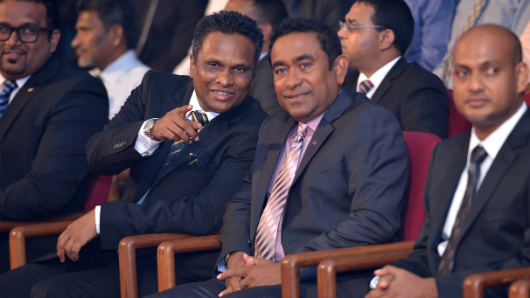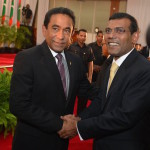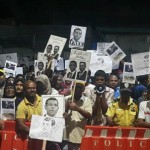President Abdulla Yameen has called on the State Trading Organisation (STO) to widen the company’s scope into the international global markets.
At a ceremony held at Dharubaaruge last night to mark the company’s 50th anniversary, Yameen spoke of diversifying the company into numerous fields including the establishment of a national shipping line and operation of oil tankers, assuring the government’s support in these ventures.
“We must find ways to reduce the price of oil and to find low priced oil,” Yameen said.
Oil exploration – via the STO’s subsidiary Maldives National Oil Company – was an election pledge of President Yameen, with a German research vessel conducting oil and gas exploration research in August 2014.
Expressing his confidence that diversification into shipping would reduce costs, especially oil prices, Yameen said that the STO cannot always remain a small scale retailer.
The STO is the country’s primary wholesaler, responsible for bringing in the vast majority of basic foodstuffs such as rice and flour, as well as other imported commodities such as electrical goods
The president also warned that “managing directors of state owned companies will change if the companies cannot perform” to the required standard.
Yesterday (January 22), Ibrahim ‘Bandhu’ Saleem was dismissed from the post of Managing Director of Maldives Airports Company Limited (MACL). No specific reason was given regarding the decision.
Yameen said yesterday evening that his office was working with the treasury to audit state-owned companies in order to determine whether they are reaching set targets as well as to categorise the firms and to align their pay structures to ensure employees are paid fairly.
According to Article 212 of the Constitution the auditor general has the authority and power to audit all institutions primarily funded by the state and “any business entity, in which shares are owned by the State”.
The STO launched an austerity campaign twelve months ago, pledging to cut operations costs by MVR50 million by the end of 2014 after President Yameen had declared the company bankrupt upon assuming office in November 2013.
“Not only does STO not have dollars, it does not have Maldivian Rufiyaa either. Funding the oil import through STO is now a burden for the state,” said Yameen at the time of the announcement.
Managing Director at the STO Adam Azim said last month that the company’s debts will be paid off within three years, telling Haveeru that its US$144 million (MVR1.7 billion) debt was unprecedented, and that US$51 million had been paid off during his tenure as a result of reductions in expenditure.
Meanwhile, Haveeru yesterday published corruption allegations against Azim – the brother of recently dismissed Minister of Defence and National Security Mohamed Nazim.
The paper reported that it has obtained a copy of an Anti-Corruption Commission report which says Azim attempted to use the state-owned company’s money to influence the Football Association of Maldives’ congress.
Haveeru suggested the report revealed attempts to have a relative appointed to the post of FAM president through sponsorship money given to football clubs with voting rights in the congress.
Presidential spokesman Ibrahim Muaz said that no decision regarding the removal of Azim had been made and that relevant authorities and institutions will investigate and proceed with the issue of any corruption allegations.
Azim appeared alongside the president at yesterday’s anniversary celebrations.
Related to this story
State Trading Organisation bankrupt: President Yameen
Yameen bring changes to state institutions following Nazim dismissal
STO to pay off debts in three years






Governments should not get involved in business. It never is a good idea. It leads to inefficiency, corruption, accountability issues and so on.
Business should be run by business people and not politicians! Years ago, there was another state owned shipping company that didn't fare too well. Are we to repeat that episode again? Having your own tankers doesn't necessarily lead to lower oil prices.
A balance must be struck between capitalising and national interests interests.
For example energy security.
Nor is total capitalistic policy right. Say it would be cheaper and more reliable to import labour than depend on the lazy indigenous workforce, but some point the line must be drawn.
It's a inbred crowd it takes time for Hill Billy tendencies to be overridden
There is no way that STO or state companies can be successful in any kind of real competition. Why? Because of Politics.
The Government appoints politicians to state companies whose task no 1 is to recruit people to the ruling part by ab/using the company.. so senior managers know they are given a blank cheque to be corrupt. And side benefits happen too.
On international markets, unfortunately for STO not every country is Burma. Countries have rules. Would STO survive under rules of normal competition outside Maldives. To test it, first it needs to operate within rules in the Maldives under capitative conditions.
The dilemma faced by any MD of STO would be
a) do his job well and be fired sooner because he did things properly vs,
b) be in the good books of the ruling party of the time, by doing his job improperly, thus ensuring his job security.
compare a) and b) and you know why being an MD of a state companies is a dead end.